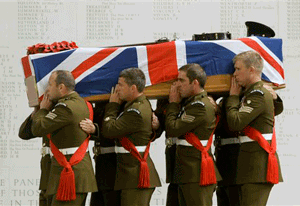Brown Holds His Ground as Troops Die
Britain's Prime Minister Gordon Brown defended his government's policy in Afghanistan after eight British soldiers were killed over the weekend. In the past two weeks, 15 U.K. servicemen have died, making the total death toll for British military personnel in Afghanistan greater than the Iraq toll, 179. As a result, Brown and his ministers have been under increasing criticism by the MPs.
Britain’s Prime Minister Gordon Brown defended his government’s policy in Afghanistan after eight British soldiers were killed over the weekend. In the past two weeks, 15 U.K. servicemen have died, making the total death toll for British military personnel in Afghanistan greater than the Iraq toll, 179. As a result, Brown and his ministers have been under increasing criticism by the MPs.
Your support matters…The Guardian:
Gordon Brown today delivered a robust defence of government policy in Afghanistan amid signs that the cross-party consensus on the issue is starting to break down.
In a statement to the Commons, the prime minister said that helicopter capacity in Afghanistan had almost doubled over the last two years and that commanders on the ground were satisfied that they had the manpower they needed.
But David Cameron, the Tory leader, said that in reality there had been “no increase in helicopter capacity at all” because the number of troops in Afghanistan who needed them had doubled since 2006.
Independent journalism is under threat and overshadowed by heavily funded mainstream media.
You can help level the playing field. Become a member.
Your tax-deductible contribution keeps us digging beneath the headlines to give you thought-provoking, investigative reporting and analysis that unearths what's really happening- without compromise.
Give today to support our courageous, independent journalists.






You need to be a supporter to comment.
There are currently no responses to this article.
Be the first to respond.